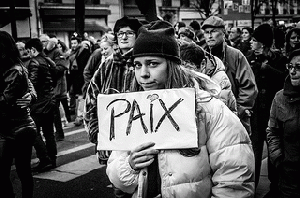The world supports France as it mourns the 17 people killed in last week's massacres. In the wake of the tragedy, many world leaders have highlighted the important values of peace, freedom of the press, and accountability. But how true have Western societies been to these ideals and what is their promise for promoting the empathy and justice needed to bridge cultural divides?
Violence and Peace -- The responses to the Charlie Hebdo cartoons caused tremendous suffering. How do those who respect human rights assess these recent developments:
- America's sale of chemical weapons to Saddam Hussein and help targeting these weapons.
- Sanctions imposed on Iraq which killed an estimated 500,000 children.
- The invasion of Iraq and destabilization which likely killed over 1,000,000 people (adjusted for time).
- A policy at odds with the world on Israel that severely undermines work towards a two-state solution and accountability for war crimes.
- Decades-long military support for regional dictators.
- Torture at Abu Ghraib and other places, and a rendition program supported by of the world's countries?
These actions have resulted in few criminal prosecutions or reform of policies by Western powers. More recently, Western or American powers:
- Backed the government of eight-year Iraqi President Nouri al-Maliki that imprisoned, tortured, and executed Sunnis.
- Implemented a drone program targeting several nations with primarily Muslim populations.
- Refused to support investigations after the publication of a shocking report on CIA torture.
- Entered into a war with ISIS with almost unprecedented haste and changing scope.
How do these events (and the Muslim victims of such policies) cause us to question or reassess our own commitment to peace?
Freedom of the Press (and Expression) -- Freedom of speech and of the press are this week's rallying cry. Yet how do we reconcile the fact that so many of those injured or harmed by Western powers, as described above, are "unmournable bodies" ---people we may unconsciously regard as less worthy of sympathy than others? Teju Cole suggests in the New Yorker that "we should at least pause to consider how it is that mainstream opinion so quickly decides that certain violent deaths are more meaningful."
Recently, the press has largely failed, in part because of pressure from governments to be patriotic or to avoid stories in the public interest that supposedly breach national security. To wit:
- The only American in jail over the CIA's torture is whistleblower John Kiriakou. The mainstream press has stopped covering the unimaginably brutal torture of Muslims only a month after the publication of the Senate's report.
- President Obama's administration has prosecuted more whistleblowers under the Espionage Act than all other presidents combined. The US landed the #46 spot by Reporters Without Borders' 2014 ranking of press freedom (seven above France).
- Few, if any, American mainstream media published most photos from Abu Ghraib.
- Very few, if any, news media profiles many civilian Muslim victims, as this New York Times piece did for Charlie Hebdo victims.
- The same administration officials and pundits who advocated the invasion of Iraq were asked to provide public commentary on the bombing of Iraq and Syria. A FAIR study found only 6 of the 205 guests opposed military action before airstrikes started; guests addressed few of the failures of recent wars.
- Mainstream media rarely address those killed as a result of the Western drone attacks or wars, raise questions about the legality of such wars, or examine the objections of foreign leaders and citizens.
Accountability -- Freedom of the press should advance social justice and peace. But the absent focus on Muslim experience has led to little understanding of other parts of the world. This failure fuels the continued bafflement over ideology: "We do not understand the movement," said Special Operations commander Michael Nagata about ISIS, two weeks ago. "We do not even understand the idea."
In the context of these problems, we have to ask why no national or international commission has examined the war in Iraq or the Global War on Terrorism for lessons learned, and applied these learnings to future conflicts. Why have American policies helped foster the conditions that resulted in terrorism, as in Somalia or other impoverished regions? What responsibility does our country bear for the conditions that have generated the current crises?
Until we answer these
questions, our policies will be uninformed and doomed to fail. Until we find
better ways to embrace peace, a free press, and an accountable justice system
are necessities, we will not live up to our cherished values.






